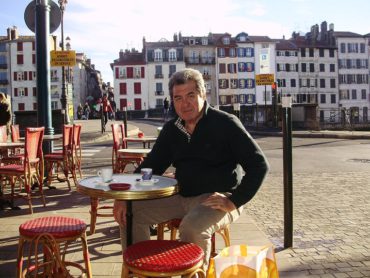Stephen Stratford on Alan Duff:
His dark materials: born in 1950 to an abusive, often-drunk Maori mother; diving for pennies at Whakarewarewa; borstal boy (assault; breaking and entering); a brother’s funeral that ends in ‘violent, drunken chaos’; prison in England (forgery).
His light materials: gentle scientist booklover Pakeha father; older brother Nick who gave him Gerald Manley Hopkins to read. ‘These words leaped out at me,’ he says in his 1999 memoir Out of the Mist and Steam. ‘The lights went on… I became instantly certain that I’d write one day, that I’d be published.’
Then came an immersion in Faulkner, Steinbeck, Hemingway, Styron, books on architecture – but also, crucially, Hubert Selby Jr’s Last Exit to Brooklyn ‘whose stream-of-consciousness style, unconventional punctuation and spelling gave the work a manic energy and immediacy’.
Fast-forward to the launch of Once Were Warriors in 1990. The year before I’d met Alan at my sister’s in Takapuna – Nick Duff is a family friend. We had a long talk about books over the kitchen table. I liked him. A bit intense, but I supposed that’s what you got with authors. The launch at Ellen Melville Hall was the best I have ever attended. There was ‘a bus-load of relatives and whanau from Rotorua’ and huge support from Auckland’s literary community. Almost everyone bought a copy of the hardback – imagine that, a first novel in hardback!
And whew, the book turned out to be good. So good that it became an instant bestseller, was made into a movie, is still in print. My favourite story about it is from a teacher at an Auckland girls’ school: the pupils were told not to read it because Alan Duff was a bad man with wrong ideas. So the book was passed around covertly, samizdat-style, from girl to girl.
And they loved it because it described if not their lives then the lives of kids they knew.
Other novels followed. One Night Out Stealing in 1991, even more technically accomplished with its interweaving narrative voices; What Becomes of the Broken Hearted in 1996 (it won the 1997 Montana NZ Book Award); Szabad in 2001, and more. In 2019, Duff released a non fiction work A Conversation with my Country.
Characters caught between two cultures often feature: in 2008’s Dreamboat Dad, the narrator is the child of a Maori woman from Rotorua and a US soldier visiting during World War II. The other major theme is machismo and male violence. In Szabad, set in Hungary in the 1950s, rage itself is an entity, the narrator says, ‘who has long resided in me and threatens to take over’. Balancing this is respect for women as a force for good and empathy, notably Merita and Lena in Dreamboat Dad and Beth in the Heke trilogy. I’ve stood beside Alan while he received a (justified) dressing-down from a sister-in-law. He took it. He actually walks the talk with this stuff and I admire him for that, even more than I admire his writing.
And then there is Books in Homes. You can read all about it elsewhere but it was his idea, executed brilliantly by Christine Fernyhough, and to date has got more than ten million books into the kind of homes that Alan’s novels depict. Few writers really make a difference. Alan Duff has.
.
Bio
Alan Duff is the author of eleven novels, also a memoirist, commentator and founder of Duffy Books In Homes. He has written for radio and as a regular newspaper columnist. Son of scientist Gowan Duff and Kuia Hinau (of Ngāti Rangitihi and Tūwharetoa), he has been an outspoken commentator on Māori affairs, and was the driving force behind the Books in Homes scheme, which aims to make books available to underprivileged children at minimal cost.
Alan has written numerous successful books both New Zealand based and overseas. His most well-known draw upon his own childhood experiences. His first published novel Once Were Warriors (1990) was a huge success, winning the PEN Best First Book Award, runner-up in the Goodman Fielder Wattie Award, and was subsequently made into an internationally acclaimed film, for which he wrote the original screenplay. In 2003 Once Were Warriors was also brought to the stage across New Zealand as a musical drama. A raw and powerful portrayal of Māori in New Zealand society Once Were Warriors is regarded as a New Zealand classic. The sequel to Once Were Warriors, his book What Becomes of the Broken Hearted? (1996) was the winner of the fiction section of the 1997 Montana Book Awards and was also made into a film of the same title.
Accolades
Montana Fiction Book of the Year Award for What Becomes of the Broken Hearted (1997)
PEN Best First Book
Buddle Findlay Sargeson Fellowship (1991)
Goodman Fielder Wattie Book Awards, second place for Once Were Warriors (1991)
Links
Read NZ Te Pou Muramura writer page
Wikipedia
Penguin Books author page
Duffy Books in Homes – the Alan Duff Charitable Foundation
Stuff review of A Conversation With My Country (July, 2019)
Radio NZ interview discussing A Conversation With My Country (June, 2019)
NZ Herald article and extract from A Conversation With My Country (June, 2019)

